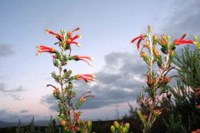
Top stories






More news


Marketing & Media
Ads are coming to AI. Does that really have to be such a bad thing?














The news follows a positive reception to the announcement made in early 2011 that Cape Town plans to proclaim 15 new reserves under the Protected Areas Act of 2003. A public participation process followed, which was supplemented with radio interviews and newspaper articles and received a mostly enthusiastic response.
According to the new proposal, the Diep River reserve, the Zoarvlei and Rietvlei wetlands and the Milnerton Race Course nature reserve - all located in the city's northern suburbs - will be merged into one and called the Table Bay Nature Reserve.
The existing False Bay Ecology Park on the southern coast has been extended to include portions of the coastline and will become the new False Bay Nature Reserve, while the small 3.6ha Botterblom Park in Durbanville, on the northern boundary of the Cape Town metropolitan area, has already been declared a new nature reserve.
In a recent press release, Belinda Walker of the mayoral planning committee stated, "In addition to the intrinsic value of Cape Town's unique biodiversity and open spaces, the city's nature reserves are economic and social assets for the local community."
Cape Town is world-renowned for its wealth of biodiversity, a major tourist drawcard. The region boasts over 3 250 native plant species and 19 different vegetation types.
Urbanisation and other factors have put much of this natural treasure at risk, and 319 species are threatened with extinction, according to the Red List of the International Union for the Conservation of Nature. Already 13 plant species are extinct in the wild, so the time to act is now.
Biodiversity provides the region with vital benefits like food, shelter and protection against wind, sand and flood erosion. If biodiversity is allowed to deteriorate, the effects of climate change may be severely felt. Cape Town will become a more sustainable city if natural systems in its urban environment are conserved and enhanced.
One of the city's greatest attractions as a tourist destination is its vast open spaces. Currently there are more than 30 nature reserves and natural areas scattered across Cape Town. This network of open spaces provides protection for vulnerable fauna and flora, and also contributes to education, recreation and conservation of natural heritage, as well as job creation.
On the Cape Town website, a report states that many of the city's nature reserves do not have adequate conservation protection. Those which do have conservation protection have expanded, but official reserve boundaries have not been adjusted accordingly. Once the boundaries have been officially established, these newly acquired areas will also be protected.
Once the proclamations are finalised, city management plans to establish advisory committees to help oversee the reserves. These committees will be made up of representatives of the community parties as well as various specialists. They will facilitate communication between all parties concerned, and will ensure sound management of the reserves in the future.
MediaClubSouthAfrica.com is hosted by the International Marketing Council of South Africa (IMC), the custodian of Brand South Africa. The site is a free service for all media professionals - journalists, editors, writers, designers, picture editors and more - as well as for non-profit organisations and private individuals. Its specific focus is on South Africa and Africa.
Go to: http://www.mediaclubsouthafrica.com/